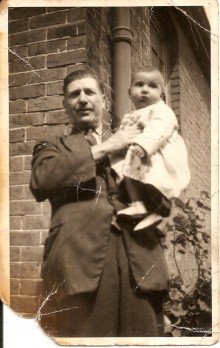My nan in common with all old Poole people, or ‘Pooleites’ as we prefer to be known, liked nothing better than to reminisce about the old town, the way it was before the demon planners ran riot and systematically destroyed it from the 1950s onwards. Poole before those dark days was a warren of wonderful old streets, lanes and alleyways, spreading inland from the vast harbour that was at its heart. Many of the buildings were medieval, Tudor, 17th or 18th century in date, architecture that in these generally more enlightened times, would be prized for the gems that they truly were, but to those unfeeling office-bound philistines at the town hall who were determined to work from a ‘clean sheet’, they were nothing more than a building site in waiting.
The recurring theme that always ran through her stories revolved around my granfer, Tom Vine, whose nickname ‘Cider’ pretty much summed up his main interests in life. He was a true Pooleite, born and bred in the town and privy to every nook, cranny and scam that existed there. He was not married to my nan, nor anyone else for that matter. He was the original free spirit who lived alone, drank when he wanted to and asked no one for favours. The fact that she was married to someone else at the time, didn’t seem to bother him either, especially as it appears that of her three other children, at least two were also conceived with the coercion of someone other than her real husband.
Lots of Poole men in the first half of the 20th century were known more by their nicknames than by their given Christian names. My nan’s real husband for example, was called ‘Hardflesh’ Gleed, presumably because he was so skinny. Others like ‘Silent night’ Williams didn’t have too much to say for themselves and ‘Nigger Short’s dark swarthy looks betrayed a commonplace racist collective mentality that nowadays would be rightfully frowned upon and discouraged.
The stories about Cider Vine should be told chronologically, in order to make sense of his life, and eventual demise and so whilst they are still fresh in my memory, I’ll relate them more or less as they were told to me.
At the time of the Great War Cider was unfortunately at the optimum age to fall victim to the frenzied jingoistic fervour that abounded then, and so he duly joined up to serve his King and country in their hour of need. In fact, Cider felt so patriotic, that he joined up about half a dozen times more, and of course, each time that he ‘kissed the flag’, he received yet another customary bright shiny King’s shilling as a reward. Eventually though, the recruiting team wised up and Cider was despatched to the front with the rest of the ‘Dorsets’.
He was decorated for his bravery and eventually invalided out after losing part of one buttock and likewise part of a heel through being blown up, and almost buried alive by the explosion. After the war he, in common with most other veterans, found that his once ever so grateful country now had a convenient lapse of memory as far as it’s returning fighting men were concerned and work became so hard to come by that he decided that the burgeoning tourist trade in nearby Bournemouth seemed like a viable source of revenue just waiting to be tapped.
To this end, he used to set out at dead of night in his ‘Poole canoe’, a sturdy flat-bottomed type of rowing boat peculiar to the town, and especially designed for use in the shallows of the harbour. His destination was the ‘forbidden island of Brownsea’ which lay just inside the harbour-mouth about a third of a mile from Poole Quay, a sizeable green paradise that Henry VIII once described as ‘the jewel in my crown’. Famed also as the venue for Lord Baden-Powell’s first boy-scout camp, it was owned in those days by a rich, elderly recluse named Florence Bonham-Christie. She did not welcome visitors to her island and employed six game keepers, whose duties included the apprehension and prosecution of anyone foolish enough to try and land on it. Cider’s motives for these nocturnal expeditions was simple. Brownsea was one of the very few places in the area that had an abundance of ‘lucky’ white heather, a crop that sold wonderfully well when offered alongside the appropriate amount of local folklore. The gullible holidaymakers in Bournemouth, Pooles brash, modern upstart of a neighbour lapped it up. Indeed Poole’s general disdain for Bournemouth could be summed up by the Purbeck writer Eric Benfield who wrote, “ many men have thought that if one day should dawn and find the whole of Bournemouth gone, the burden of the world would be a trifle eased”.
For several nights Cider crept on to Brownsea Island and off again with his precious cargo, unseen and un-apprehended by the keepers, who knew that something was going on, but just couldn’t catch the culprit.
Eventually though, Cider was ambushed and caught, but not before knocking out three of his six assailants. It seems that his other sideline as a fairground boxer had not been an entirely bad career move.. In fact, the constabulary of old Poole used to pay him to venture down the dark old alleyways that ran in to the town from the quayside, and once there, to subdue, then drag out the various drunks that had spilled out of the pubs to settle drink-fuelled scores in their shadowy recesses. Sailors from all over the world congregated in the Poole Quay pubs and Cider was quite happy to hit all of them for a price.
In the 1930s, he gained employment of a more conventional nature as a docker on the busy quayside, and this of course opened up a whole new world of opportunity for him.
Anyone who knew Cider was suddenly likely to be able to get all manner of useful and unusual goods, and it was also at this juncture that he became the father of my nan’s third child, my mother. At the outbreak of the second world war, Poole was in the front line and endured several bombing raids, care of the Luftwaffe. Various shelters were hastily dug throughout the old town and my family, who lived in Lagland Street, near the quay, used a shelter there.
Cider though would never make use of them. He never really recovered from his experiences in the trenches of the first war where he was almost buried alive, and preferred to take his chances up top amidst the falling bombs and the constant machine gun strafing. This dangerous choice did however set the scene for some of his more memorable antics. On one occasion, a bomb dropped near to the John Collier mens outfitters shop in the High Street, and soon after, as Cider made his way around in the blackout, he thought that he had stumbled across a veritable massacre. Inanimate bodies, some with limbs, some without, were strewn all over the old street, and it was some time before he finally realised that the ‘bodies’ were merely those of the several mannequins that had been blown through the shop’s window by the blast. Needless to say, several of Ciders more intimate friends were suddenly in receipt of brand new, though slightly soiled, overcoats and suits.
Possibly the most memorable of his wartime exploits happened during another air raid. He had just turned up at my nan’s house because he had heard a rumour that she had managed to get hold of a whole barrel of scrumpy, and he hoped to relieve her of a good portion of it. It was then though that the sirens sounded. My nan immediately gathered up her kids and headed for the quayside shelter, but of course Cider refused to follow her. Instead he decided to do a spot of ‘house sitting’, and soon he was helping himself to the contents of the abandoned scrumpy barrel and drank copiously as the bombs fell all around. Two hours later the dazed and weary Pooleites emerged in to the dark and gradually returned to their homes. On this occasion though, Lagland Street had received a direct hit, and as my nan stood outside her house, she cursed as she realised that all of her windows had been blown in. Ushering the kids inside, she began to start cleaning up the debris and it was only then that she noticed an unfamiliar shape on the floor of the front room. Straining her eyes, she gradually realised that it was a person, a body showered with deadly, glistening shards of glass. Screaming, she ran outside and called to a passing policeman who rushed to her assistance. The pair gingerly approached the inert, spread-eagled form on the floor and the officer shone his torch over the ‘corpse’, which caused my nan to let out another scream of horror as she realised just who it was.
As the policeman tried to comfort her with such clichés as “It must have been quick, he wouldn’t have suffered”, the ‘body’ was suddenly posessed with a new lease of life and groaned profusely as it first rolled over on the crunching glass, then attempted, unsuccessfully, to rise, and finally, demanded to know ‘what all the bloody noise was about’.
My nan and the Policeman looked on in a confused stupor. “He’s not dead at all, dead drunk more like”!! cried the astonished officer. He trained his torch on to the face and once more the pair recoiled in horror at what they saw.
Cider, blinking painfully in the glare of the beam seemed completely unable to comprehend what all the fuss was about. My nan, horrified, pointed at him. Her lips were moving but no sound was coming out.
Aghast she was finally able to splutter, “Tom, look at your face, it’s covered in beetles”.
Sure enough, Cider seemed to have acquired a beard constructed entirely of a mass of writhing cockroaches. Still quite unable to grasp exactly what was going on, he suddenly wiped a fistful of the invertebrates off of his face, and looking at them proclaimed, “They’re all right, they won’t hurt you, they’re lovely”, and then without further ceremony, proceeded to stuff the luckless creatures in to his mouth and chew them up, their crusty legs spilling out with every munch. They had seemingly been attracted by the sweet residue of scrumpy that had trickled on to his lips and chin as he drank, and he then collapsed through excess on to the floor.
The bomb blast had occurred after his subsidence and subsequent coma, which had in all probability saved him from serious injury or even death. The policeman dolefully shook his head and made his excuses to leave, but my nan, her sorrow now firmly replaced with a rising storm of anger and, also noting that the scrumpy barrel was virtually bereft of its original contents, chased Cider from her house with a broom, and it was weeks before he dared to venture back there again.
Those war years obviously saw the population of Poole and its hinterlands rise steeply as all manner of service personnel were billeted along the south coast, firstly as a deterrent against invasion, and later, in preparation for D Day. One such unit was the East Yorkshire Regiment who were stationed just outside Poole and the troops of this unit regularly thronged the large number of pubs in the old town for their recreation. On one such occasion, two drunken Yorkshire soldiers were staggering about in Lagland Street waving their heavy-buckled belts around their heads and challenging any ‘Southern Softies’ to step up and fight them.
Pooleites have never taken kindly to anyone belittling their beloved town or questioning their manhood, and so it was particularly bad luck on the part of these two Northerners that the first person to happen innocently along after they had issued their challenge was Cider Vine. The fight was apparently short and brutal, and it was Cider who walked away relatively unscathed from the two men who were left unconscious in the street to regret their former exhuberance.
Not that Cider limited his pugilistic efforts to members of his own race in those complicated years. Opposite my nan’s house was a wonderful pub called the Swan. It was covered with shiny dark green tiles and still exists today, though it is scarcely the pub it was, and has now been renamed several times to appeal to the brainless majority of todays young drinkers. My nan and her eldest daughter, who was an extremely attractive young lady, were enjoying a stout in the Swan one night, when a huge Russian sea captain with a hook for a hand gradually became drunk and aggressive, constantly smashing the hook in to the pub’s tables and damaging them. He also took a very definite shine to my aunty, and was becoming quite insistent that she returned his interest. The two women thought that they had better leave and tried to sneak out unnoticed by the giant. As they left the pub though and made a dash for their house just across the road, he saw them, and followed them out in to Lagland Street. As luck would have it, Cider was at the same time knocking on my Nan’s door and so immediately became embroiled as the huge Russian lurched after the two frightened women. Cider tried to reason with the man, but it appeared that he did not speak English. As the two women hurried inside the door, the sailor tried to push his way past Cider who fended him off. The enraged giant rushed at him again, this time taking a huge swipe at his face with the deadly hook. According to my Nan that was the last thing that the ‘great Russian bear’ did for a while. My Grandad hit him with such force that he never once touched the ground until he crashed against the wall of the Swan several yards away. Cider then apparently walked nonchalantly over and relieved the prostrate man of a huge bottle of Vodka that he had secreted in the inside pocket of his overcoat.
Although others also fell foul of Cider, including one of the black American troops, or ‘chocolate soldiers’ as they were then referred to in Poole, he drifted in to the 1950s older, but basically unchanged in his habits. He still lived alone, still enjoyed a drink whenever he felt like one and, as the decade ripened, even started his own business as a wet fish seller, pushing his barrow around the old streets he knew and loved so much. Old Poole though was about to experience such a traumatic jolt to its very fabric, that many would claim, and with good reason, that the town was never really the same again afterwards.
Those faceless grey-suited types who, then as now, eked out a good living from changing other people’s lives without ever asking them, were about to level old Poole to the ground, and in doing so, create a form of ‘ethnic cleansing’ that would rip the very heart out of the time-served community for ever more. The wonderful old houses where once lived a singular and proud population were bulldozed away in their hundreds, as street after street fell victim to their frenzy. So to, perished many of the familiar old pubs that gave the place it’s pulse.
Yes the houses were rundown and looked somewhat unkempt, but only because they had been allowed to be by those very suburb dwelling penpushers who were now covering up their iniquity by removing the evidence forever. But they also removed a unique and irreplacable history and way of life. What was erected in its place broke the hearts of many, including Cider Vine, who seemed to fade away even as his town did.
His health began to fail and he lost the room in Market Street where he had been living for a long while. My nan’s house was demolished and she was obliged, like many others from the old town, to take a council house several miles from Poole. Cider still persevered with his fish cart for a while amidst the carnage and even used to walk the many miles up to these new estates to ply his trade amongst the many displaced ‘ex-patriot’ Pooleites who now lived there. But the old days were gone and were never coming back.
However, Cider’s spirit was not completely broken as he demonstrated on several occasions, the best and most typical one being when he was on a bus up to Oakdale to visit my nan with his old dog, Floss in tow. The conductor walked up to him to get his fare and took exception to Floss sitting on the seat next to Cider, demanding that he put her on the floor. As the bus was quite empty and the seat not needed, Cider refused, saying that as he had just paid a half fare for his furry friend and so she was entitled to a seat. The conductor, a dour little Scotsman, was not convinced and said he would throw the pair of them off at the next stop if the seat was not made available for other passengers. So Cider, a rebel to the last, stood up, picked up Floss and placed her in his own seat, then sat on the floor himself saying that she could have his seat. The Conductor stared in disbelief, shook his head and just wandered off muttering.
As old age took a grip, he found himself being put into an old people’s home in Salisbury, far away from the town and county that he knew and loved. Once there and for no discernable reason that could be adequately explained to his family, the powers that be, had all his teeth extracted and my last memory of him as a 7 year old boy, was going there to visit a few weeks before his death and seeing a sad, dejected and defeated old man sitting, lost in his thoughts on a seat in the grounds. I have some old black and white photos of that day and even now I find it difficult to look at them.
Thomas ‘Cider’ Vine died there, alone, in 1964 and was buried in an unmarked grave in Poole cemetery. I was not allowed to go to the funeral, but enjoyed the food at his wake, held in the house of Nelly Gleed’s sister, where I lived for the first eleven years of my life, largely abandoned by my parents.
I remember his old World War One medals being left in a drawer there until they eventually disappeared.
Thankfully, memories, are not so easily disposed of.












